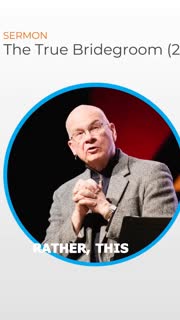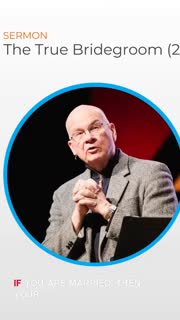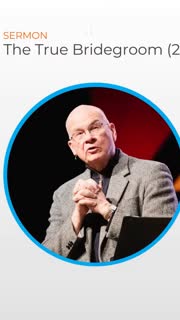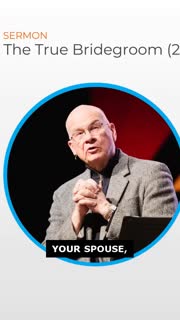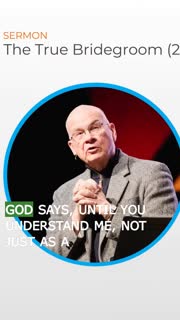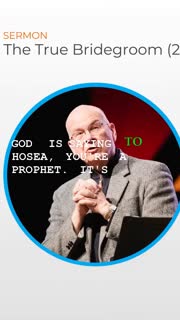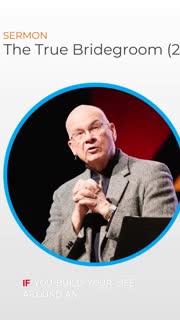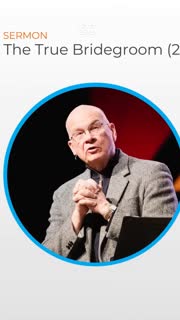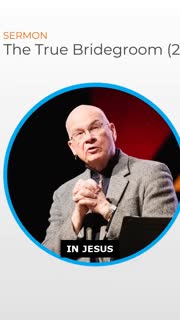God's Redemptive Love: Healing Our Broken Relationship
Devotional
Sermon Summary
Bible Study Guide
Sermon Clips
1. "Rather, this passage, that theme tells us that God wants a relationship with us so intensely personally intimate, and at the same time, so binding and enduring that he says, you can't understand me or my love for you or our relationship unless you understand me as your brother. It's not enough just to understand me as your king and your shepherd and your father. You don't really know what our relationship is about unless you also see me as your husband." [04:18] (33 seconds)
2. "If you are married, then your relationship to your spouse and your spouse has to be the number one priority in your life. Nothing can come before it. And if you do, give it that priority. And only if you do will the marriage be strong. But if you give it that priority, then if your marriage is strong and everything else in your life is a mess, it doesn't matter in a way, you move out into the world in strength." [06:34] (31 seconds)
3. "When God says, I want a relationship that is like a marriage, what he is trying to say is, you can't know me from afar. You cannot know me formally. I have got to be in every nook and cranny of your life, every centimeter, every inch of your life. I must be there. There can't be any part that you hold back from me. And, you can't just know about me. You have to experience my love." [08:40] (24 seconds)
4. "Your spouse, because of the nature of the relationship, because of the intimacy, actually, and the priority, has massive power to essentially reprogram your self-value and self-worth and self-view, and actually heal you of anything. See, and here's why. If somebody in this room comes up to me and says, you are a really kind man, I'm gonna feel good. Sure. But I'm also gonna think, fooled you. You have no idea how irritable I am." [09:47] (35 seconds)
5. "God says, until you understand me, not just as a king, not just as a father, not just as a shepherd, but as a husband, as a bridegroom, you have no idea who I am and what we could be together. So the first thing is our relationship with God is like a marriage, number one. Number two, though, the second thing we learn in this book of Hosea, and in this passage in particular, is our relationship with God is like a bad marriage." [11:52] (25 seconds)
6. "God is saying to Hosea, you're a prophet. It's your job to understand me and know who I am so you can communicate it to other people and bring the the knowledge of God into their lives and change them. This is how you're going to become a prophet because you do not understand me and you don't understand what I'm going through to love human beings and you don't understand sin and you don't understand grace and you don't understand my nature and you don't understand human nature until you have been through the experience of having the person you love most in the world absolutely betray you." [15:04] (32 seconds)
7. "What does it mean to follow another god? It means when something is more important than God in your life, if money, making money, if that turns your crank more, if that's more important to your self-image and who you are, if that gives you more joy than your relationship with God, if having children, if getting married, if being married, if your looks, if your achievements, if some great political cause, if there's anything more important than God in your life, that's your life. That's your real God, okay?" [21:02] (30 seconds)
8. "If you build your life around an individual, no matter how good he or she is, what happens when they're dead, which they will be dead? See, your idols can't save you. Your lovers, in a sense, seek your life. They can't help you when your heart is broken. God says until you understand the absolute devastation of having the person you most love betray you, be unfaithful to you, you don't understand how I feel about your waywardness and about your sin, and you don't even understand your own heart and how addicted and enslaved you are to other things besides me that can never save you and will only drive you into the ground." [22:44] (41 seconds)
9. "And so he says, I bought her. But you know what that must mean? From what we can tell, Israel in the 8th century BC, which is when Hosea and Amos was prophesying, had really decayed spiritually and culturally and was pretty much like the other pagan nations around. Therefore, had adopted many, many, many of the customs of the pagan nations around it. And therefore, it's a very, very good chance, it's most likely, that this was a public auction. That Hosea was being auctioned, as a slave in a public marketplace." [25:02] (35 seconds)
10. "In Jesus Christ, God entered the world. He entered the marketplace. And he clothed us, covering our nakedness with his righteousness. Because on the cross, Jesus Christ, Christ died and paid the price to buy us away from our enslavements. And so, you know, when God actually has the audacity to say, I'm like that bridegroom, I'm like that bridegroom seeing the bride coming down the aisle who wants to say, sweep you into his arms and wants to say, I want to give you the world and I want to lay down my life for you. I'm really like that bridegroom. That's just not rhetoric, says God. In Jesus Christ, I did. I did. I laid down my life for you." [33:09] (46 seconds)
Ask a question about this sermon
2. "If you are married, then your relationship to your spouse and your spouse has to be the number one priority in your life. Nothing can come before it. And if you do, give it that priority. And only if you do will the marriage be strong. But if you give it that priority, then if your marriage is strong and everything else in your life is a mess, it doesn't matter in a way, you move out into the world in strength." [06:34] (31 seconds)
3. "When God says, I want a relationship that is like a marriage, what he is trying to say is, you can't know me from afar. You cannot know me formally. I have got to be in every nook and cranny of your life, every centimeter, every inch of your life. I must be there. There can't be any part that you hold back from me. And, you can't just know about me. You have to experience my love." [08:40] (24 seconds)
4. "Your spouse, because of the nature of the relationship, because of the intimacy, actually, and the priority, has massive power to essentially reprogram your self-value and self-worth and self-view, and actually heal you of anything. See, and here's why. If somebody in this room comes up to me and says, you are a really kind man, I'm gonna feel good. Sure. But I'm also gonna think, fooled you. You have no idea how irritable I am." [09:47] (35 seconds)
5. "God says, until you understand me, not just as a king, not just as a father, not just as a shepherd, but as a husband, as a bridegroom, you have no idea who I am and what we could be together. So the first thing is our relationship with God is like a marriage, number one. Number two, though, the second thing we learn in this book of Hosea, and in this passage in particular, is our relationship with God is like a bad marriage." [11:52] (25 seconds)
6. "God is saying to Hosea, you're a prophet. It's your job to understand me and know who I am so you can communicate it to other people and bring the the knowledge of God into their lives and change them. This is how you're going to become a prophet because you do not understand me and you don't understand what I'm going through to love human beings and you don't understand sin and you don't understand grace and you don't understand my nature and you don't understand human nature until you have been through the experience of having the person you love most in the world absolutely betray you." [15:04] (32 seconds)
7. "What does it mean to follow another god? It means when something is more important than God in your life, if money, making money, if that turns your crank more, if that's more important to your self-image and who you are, if that gives you more joy than your relationship with God, if having children, if getting married, if being married, if your looks, if your achievements, if some great political cause, if there's anything more important than God in your life, that's your life. That's your real God, okay?" [21:02] (30 seconds)
8. "If you build your life around an individual, no matter how good he or she is, what happens when they're dead, which they will be dead? See, your idols can't save you. Your lovers, in a sense, seek your life. They can't help you when your heart is broken. God says until you understand the absolute devastation of having the person you most love betray you, be unfaithful to you, you don't understand how I feel about your waywardness and about your sin, and you don't even understand your own heart and how addicted and enslaved you are to other things besides me that can never save you and will only drive you into the ground." [22:44] (41 seconds)
9. "And so he says, I bought her. But you know what that must mean? From what we can tell, Israel in the 8th century BC, which is when Hosea and Amos was prophesying, had really decayed spiritually and culturally and was pretty much like the other pagan nations around. Therefore, had adopted many, many, many of the customs of the pagan nations around it. And therefore, it's a very, very good chance, it's most likely, that this was a public auction. That Hosea was being auctioned, as a slave in a public marketplace." [25:02] (35 seconds)
10. "In Jesus Christ, God entered the world. He entered the marketplace. And he clothed us, covering our nakedness with his righteousness. Because on the cross, Jesus Christ, Christ died and paid the price to buy us away from our enslavements. And so, you know, when God actually has the audacity to say, I'm like that bridegroom, I'm like that bridegroom seeing the bride coming down the aisle who wants to say, sweep you into his arms and wants to say, I want to give you the world and I want to lay down my life for you. I'm really like that bridegroom. That's just not rhetoric, says God. In Jesus Christ, I did. I did. I laid down my life for you." [33:09] (46 seconds)
